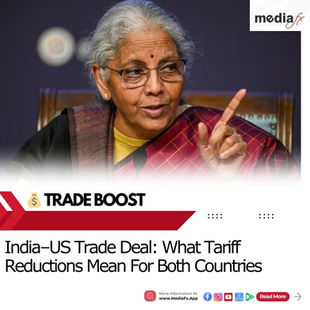🌏 India-US Ties Shake-Up! Multipolar World Rising
- MediaFx

- Sep 18, 2025
- 2 min read
TL;DR: India-US relations are turning bumpy, with trade tensions, tariffs, and strong words creating distance. At the same time, India is asserting independence—buying Russian oil, engaging with China and Russia, and shaping its role in a new multipolar world order. The US is no longer the unquestioned global boss, and the Global South is finding its collective voice.

For decades, the US acted like the world’s big boss—leading wars, expanding NATO, and using institutions like the IMF and World Bank to maintain dominance. But things are changing. The unipolar world with one superpower is giving way to a multipolar system, where many powers—China, Russia, India, Brazil—are shaping global politics. #MultipolarWorld #GlobalSouth
US Losing Its Grip
Since 1991, the US carried out more than 250 military interventions, expanded NATO, and pushed neoliberal economic policies that mainly benefitted its corporations. At the same time, it outsourced industries to Asia, especially China. Today, American workers are frustrated, their industries are weaker, and its influence is slipping. #USDecline
India’s Smart Moves
India has stopped blindly following Washington. Even after Donald Trump insulted India by calling it a “dead economy” and imposing tariffs, India stood firm. It continued buying discounted Russian oil, exporting agricultural products to Russia, and opening dialogue with China. #IndiaFirst
The SCO Factor
The Shanghai Cooperation Organisation (SCO) has become a key platform where leaders like Modi, Xi, and Putin sit together and push for regional cooperation. India and China even signed a 10-point agreement to reduce tensions at the border—though problems remain, it signals a shift in regional politics. #SCO
Why the US Is Worried
America fears losing its global control. It cannot dictate oil flows, it cannot stop India from deepening trade with Russia, and it cannot block China’s rise. The old dominance is fading, and emerging economies are speaking up more confidently. #PowerShift
Impact on Common People
For everyday Indians, this shift could mean:
Cheaper oil leading to less petrol price hikes
Stronger trade ties boosting exports for farmers and small businesses
More independent policymaking focused on people, not foreign corporates
But risks remain. Big powers don’t give up control easily. Sanctions, trade wars, and conflicts can still hurt ordinary workers and farmers the most.
MediaFx Take
From the people’s perspective, a multipolar world is better than a single global boss. No country should control the fate of billions. India’s role should be clear: stand for peace, protect workers and farmers, and ensure dignity for all citizens. The true measure of strength is not global deals but whether the common person has affordable food, secure jobs, and respect.













































